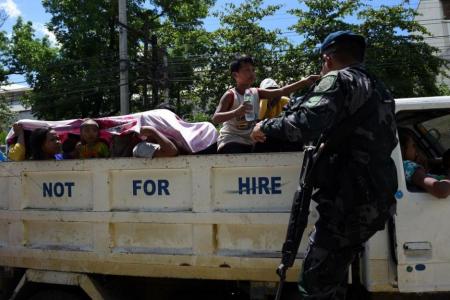Duterte threatens martial law across the Philippines
Crackdown after militants go on rampage in Mindanao
MANILA: Philippine President Rodrigo Duterte threatened yesterday to impose martial law nationwide to combat the rising threat of terrorism, after Islamist militants beheaded a policeman and took Catholic hostages while rampaging through a southern city.
Mr Duterte declared martial law on Tuesday for the southern region of Mindanao, which makes up roughly a third of the country and is home to 20 million people, in an immediate response to the attacks by the gunmen, who have pledged allegiance to the Islamic State in Iraq and Syria (ISIS).
About 100 militants roamed Marawi city, killing five soldiers, taking hostage a priest and an unspecified number of other people from a church, setting fire to buildings and flying black ISIS flags, according to Mr Duterte and his aides.
Mr Duterte said the militants also beheaded a local police chief after capturing him at a road checkpoint they had set up.
He expressed outrage at what he called the growing threat from militants allied to ISIS in Mindanao.
"I will not hesitate to do anything and everything to protect and preserve the Filipino nation," he said.
"I might declare martial law throughout the country to protect the people."
Mr Duterte, who has waged a controversial war on drugs that has claimed thousands of lives, warned that the martial law will be "harsh" and similar to the military rule imposed by dictator Ferdinand Marcos a generation ago.
Mr Marcos' two-decade rule ended in 1986, when millions of people took to the streets in a "People Power" revolution.
Thousands of critics were jailed, tortured or killed during the dictatorship, according to historians and rights groups.
'VERY GOOD'
"Martial law of Mr Marcos was very good," Mr Duterte said, as he railed against human rights campaigners and other critics of his drug war.
He said his own version of martial law means security forces can conduct searches and arrest people without warrants.
He also said there will be curfews for some provinces in Mindanao, and that martial law will remain until the terrorism threat had ended.
The fighting in Marawi erupted on Tuesday after security forces raided a house where they believed Isnilon Hapilon, a leader of the infamous Abu Sayyaf kidnap-for-ransom gang and Philippine head of ISIS, was hiding.
The US regards Hapilon as one of the world's most dangerous terrorists, offering a bounty of US$5 million ($S6.9 million) for his capture.
The militants responded by burning buildings and conducting other diversionary tactics in Marawi, according to Defence Secretary Delfin Lorenzana.
Thousands of residents fled Marawi, according to an AFP photographer at a military checkpoint near Iligan, the next biggest city about 40km away.
It was unclear yesterday night how many militants were still in the city or if they had escaped to nearby mountains and forests that they have long used as hideouts. There were no reports of major clashes yesterday. - AFP
Get The New Paper on your phone with the free TNP app. Download from the Apple App Store or Google Play Store now


